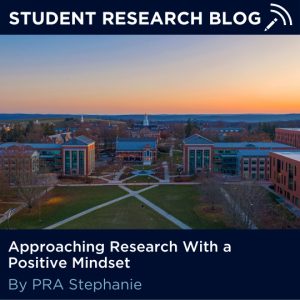 By Stephanie Schofield, Peer Research Ambassador
By Stephanie Schofield, Peer Research Ambassador
It’s the start of another busy and hectic semester, and there’s no doubt that you’re probably feeling overwhelmed at that massive list of things you must conquer. Moving back into a dorm, figuring out where your classes are, reading syllabi, thinking about that first chemistry exam you want to ace…. It feels never ending, right?! And on top of all of that, you want to get involved in research. How on earth are you going to manage all of it?
The answer: you are, and you’re going to manage it all much better than you give yourself credit. So, take a deep breath, and know it will all work out!
In my first semester at UConn, research talk was all around me. It almost felt like a race to see who was going to land their research placement first. When searching for research the first time, I saw it as another to-do on my list. This is not at all to say my outlook on research was negative, however, I spent more time feeling overwhelmed and stressed over it, instead of reading up on labs and feeling excited about getting involved. What if I can’t find a lab? What if I can’t balance research with academics? What kind of research do I even want to do? Is it even worth it?
These questions kept me up all night for quite a while, and in my case, I decided that at the start of that semester, I was going to put my lab search on the back burner until I had gotten the hang of college life in general. For me, this worked out well, and I ended up volunteering in a lab that I was super interested in, and I was thrilled. All the questions that kept me up at night proved useless and turned out the complete opposite.
That first experience I had was pre-coronavirus, unlike the new and uncharted semester we now all face. During the pandemic, my research halted in the lab I was volunteering in, and I once again was back at square one. Again, I was worrying over where my next research experience would take me. This time, I faced the looming question of “Where am I possibly going to be able to do research in the middle of the pandemic?”. But this time, instead of letting my anxiety over landing that next research experience get a hold of me, I turned to healthier outlets to work through my worries both in research and in my academics. I traded an hour of worrying for a calming hour-long hike. I replaced thoughts like “Maybe you’re not qualified enough” with “No matter what the outcome is, you’re going to learn regardless”. When I felt myself getting overwhelmed, I took a step back from my studying and lab searching to go watch an episode of my favorite Netflix show. Most importantly, the pandemic changed my view on my education. Instead of looking at my classes as something I just needed to pass, I immersed myself in what I was learning and was able to narrow down my interests. That winter, I applied to as many summer internships as I possibly could and was grateful for even the rejections I received. I set aside time in my schedule to work on applications and lab searching to make sure I didn’t overwhelm myself.
When I eventually interviewed for the Health Research Program, my interview with my now Principal Investigator, was the only one I didn’t prepare for. Ironically, this couldn’t have worked better for me as it had been the most natural and enjoyable interview I had ever done in my life. The lab that I thought wasn’t as aligned with my interests ended up being the best fit for me, and as I got further into my research in my current lab, I realized the other research options I had felt obligated to apply to weren’t areas I was super interested in. When I met one on one with the graduating undergraduate in my lab, she told me something that has stuck with me since: “The opportunities that seem least likely are often the best ones”.
Looking for research opportunities can be daunting, but in the end, it all works out better than you could possibly expect. While looking for opportunities, don’t let yourself get stressed out. It’s natural to worry about all the what if’s when it comes to finding a lab, but going into it being grateful for every aspect of the journey is extremely rewarding. So, what are you waiting for! Get excited to starting your search process, you’re going to learn so much and eventually, you’re going to find that perfect fit. Your journey has only just begun, no matter what age, year, major, or background you are from. The opportunities are endless, are you ready to embark on the adventure of a lifetime?!
For more, meet with an OUR advisor or Peer Research Ambassador to learn about research opportunities offered by the university or to explore other off-campus opportunities.
Stephanie is a junior majoring in Molecular & Cell Biology, and minoring in Chemistry and Psychological Sciences. Click here to learn more about Stephanie.